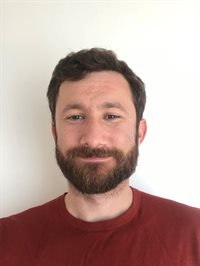Technical Analyst & Developer at Broadridge
PhD Physics, 2019
 Please tell us a bit about your current role
Please tell us a bit about your current role
I work as a technical analyst and developer for a Post-Trade FinTech company, designing and building out software solutions to meet client requirements, deliver new functionality and to enhance our current product capabilities. I'm also a deputy 'scrum lead' (a deputy team leader) and have recently transitioned from the company's graduate training program.
Going into my job hunt, I knew that finding the specific role I wanted within academia in the right place to fit my circumstances at the time would be difficult, so applied for jobs in industry in parallel to trying to find further academic opportunities. Having not been in industry before and considering a change in fields, a role with good training opportunities was appealing to me and this is where I focused my search. The recruitment process was quite straight forward and consisted of a LinkedIn application form, a phone interview and then an assessment day.
What motivated you to do your postgraduate research course?
My original motivation stemmed from a fascination in stellar evolution and wanting to firstly understand more about the subject area, and secondly try to contribute to the field and nudge the collective knowledge base even just a little bit further beyond the current limits. I wasn't thinking too broadly about what would come next, but just challenging myself to contribute to a field I found interesting in a constructive way that hopefully others could then build on top of.
What do you enjoy most and what do you find challenging about your role?
The problem solving aspect and continually being challenged to figure out how new product areas operate are definitely the most rewarding and enjoyable parts of my job as I still get to improve my existing skills and learn new things. The most rewarding is also definitely the most challenging part, especially on the learning new functionality side. Often there is not much documentation or many experts within the company to start you off, so you're learning almost from first principals each time. Great for building foundational knowledge, but can definitely slow things down!
Have you faced any barriers during your career journey, if so, how did you overcome them?
For me, the hardest part of my career journey so far was the job application phase. I was applying for jobs and postdocs at the same time as writing up my thesis and ended up overloading myself until I one day just crumpled under the stress I'd been putting on myself. I tried to take on too much at once and it didn't work for me.
After this point, I didn't apply for a single job for a month and got two interviews within a week of each other - one of which was for the job I do now! It was a tricky period that I certainly wasn't prepared for.
Hopefully the advice below will be useful for not repeating what I did:
- Applications take time and definitely don't work to your timescales. Try to be patient and relax about the process as it'll happen when it happens.
- All interviews are good practice. Even if they're for roles you aren't fully interested in, use them for honing your technique and getting you comfortable for when the interview you really want comes around.
- Be open minded to the jobs/fields you apply for. There are some roles out there that suit you in fields you would never have thought of!
- Don't be afraid to prioritise back onto your work. I understand having the security of a job after your studies is important, but don't forget why you're doing what you currently do and or be concerned about focusing fully on that. It can end up being a good distraction and reset for your mind from all of the job hunting.
- Finally, be positive! You're highly skilled and there's someone out there looking for your talent!
How did your time at Birmingham help you prepare for this role?
My time at Birmingham really helped to shape my way of thinking, especially when it came to approaching problem solving and analytical tasks. It also exposed me to a variety of working practices and styles due to the international collaborations I was part of, and teaching me how to communicate effectively with a broad spectrum of people. Both of these areas have been key for both the nature of the work I now do and the multi-national team I'm part of.
Completing my PhD also taught me a great amount of resilience and patience in the face of challenges. This has given me a strong appreciation of how to approach problems, what avenues to explore and when to ask questions to maintain momentum.
What advice would you give to students interested in further study?
The best advice I can give is to make sure that you are motivated by the subject that you want to undertake and, if possible, check that the supervisor and group you want to join have a dynamic that you feel will support you. Doing a PhD isn't the easiest of things to do and you're committing a significant amount of time to study one particular area. Making sure that this is something that excites you and that you're doing it with people that care for you as person, and not just a researcher, are definitely important.
I'd also recommend making sure you're active with other things outside of the PhD too. It can sometimes feel a little all consuming, and having something to escape into will help you switch off and have a better balance.